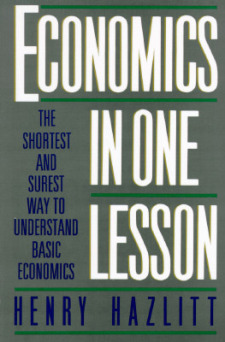 economics,
economics,  economics in one lesson,
economics in one lesson,  hazlitt,
hazlitt,  single lesson,
single lesson,  textbook in
textbook in  Economics,
Economics,  History
History  Friday, September 7, 2012 at 2:56PM
Friday, September 7, 2012 at 2:56PM  The first 45 years of the 20th century was a revolutionary time for economics- literally! The transformation of much of Europe, two world wars, the rise of American commercial/industrial supremacy and the creation of the first major socialist state- Soviet Russia. All of these things were (at least in part) results of change in how people viewed economics. From university professors, to political power brokers, economics had become the testing ground for the philosophies of Smithian capitalism to Marxist socialism. The results of all those theories attempted to be "proven" in real world situations meant that success and failure stories were strewn across the globe and time.
The first 45 years of the 20th century was a revolutionary time for economics- literally! The transformation of much of Europe, two world wars, the rise of American commercial/industrial supremacy and the creation of the first major socialist state- Soviet Russia. All of these things were (at least in part) results of change in how people viewed economics. From university professors, to political power brokers, economics had become the testing ground for the philosophies of Smithian capitalism to Marxist socialism. The results of all those theories attempted to be "proven" in real world situations meant that success and failure stories were strewn across the globe and time.
During the first half of the 20th century, economic theories and teachers were seen as "prophets" in a world of uncertainty. From philosphy to math, economics promised to help us understand our world. But much was confusing about this discipline. Into this world comes Henry Hazlitt.
Instead of creating a new school of economics, confronting the various theories and gurus, Hazlitt wrote a book on a single principle. "Economics In One Lesson" is that lesson, and it has become the most popular economics textbook in history. His secret? Follow the money.
Hazlitt describes the issue with most economist failures as the short-sightedness of looking only to a single group in the short term, rather than to all groups for both short and long term effects. From this single truth, the entire book explodes with explanations and examples that are easy to understand, but explore the root of almost all economic idiocy that hampered the markets of the past (and still plague the economic systems of the present). Hazlitt takes no political or idelogical swings at others, though he stands clearly in the capitalist river of economic thought. It's an excellent book for people encountering economics for the first time, and very good for experienced economic "experts" who tend to forget this seminal counterbalance to so many new theories of economic prediction.
Amazon Book Link: http://amzn.to/TyM111
A classic book that makes an often confusing subject clear for everyone. Though it was originally written in 1946, it has been revised with a second edition update and this text remains a test to its timeless application for anyone wishing to learn about economics.
Review by Kim Gentes
 economics,
economics,  economics in one lesson,
economics in one lesson,  hazlitt,
hazlitt,  single lesson,
single lesson,  textbook in
textbook in  Economics,
Economics,  History
History
Reader Comments